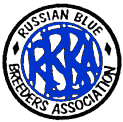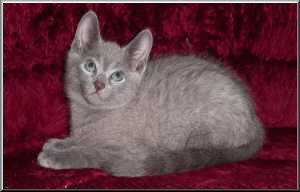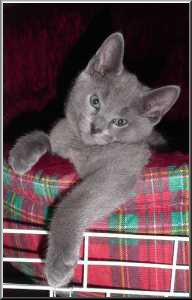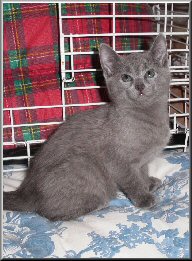Notes for New & Prospective Kitten Owners
WHERE CAN I FIND A KITTEN IN THE UK? I apologise to those readers from outside the UK who are looking for a kitten - the RBBA only has contacts within the UK. Try http://www.russianblue.org/ or http://www.breedlist.com/russian-blue-breeders.html for lists of breeders in America. If want to to find a kitten please either contact your nearest Russian Blue breeder or ring The Kitten Secretary of the Russian Blue Breeders Association who will advise you of any others in your area:
If the kitten is advertised or sold as a pedigree Russian Blue then the breeder must provide the new owner with a signed pedigree certificate of at least 3 generations. The breeder should also give the new owner the registration document, this is in the form of a pink transfer slip. To transfer ownership of a cat or kitten the transfer slip needs to be signed by both the breeder and the new owner and sent to the office of the Governing Council Of The Cat Fancy accompanied by the appropriate fee. If the transfer slip is marked "no progeny to be registered" then the cat should not be used for breeding as the GCCF will not register its offspring. Kittens for showing must be registered and transferred into the name of the new owner 21 days before the date of the show. Many kittens are sold with insurance to cover any illness or accidents that might occur during the kitten's first few weeks in its new home.
Selecting a kitten is difficult. Consult a vet about breeders he/she knows or the Russian Blue Breeders Association who can put you in touch with local breeders known to have kittens available. Go and see the kitten(s) and its parents before it is ready to leave and watch it grow up and note how its character develops. Select a playful, active kitten with bright eyes, a shiny coat and mite-free ears. Remember that although cats are relatively self-sufficient pets, if you are at work all day, two kittens will enjoy each others company and play together. When you get your kitten, check that you have certificates of inoculation; pedigree, a registration slip and a filled-in transfer slip. (In some cases registrations can take some time, so do not worry if this document is not available and the breeder sends it on to you.) If you have a registration certificate, you can send the transfer slip to the Governing Council of the Cat Fancy so that the cat can be registered in your name. Kittens can be registered on two different lists: one is called the Active Register, which means that the kitten/cat is considered suitable for breeding and that any progeny can be registered with the GCCF. The cat can also be shown. The other is the non-active Register which means that the cat is not suitable for breeding and that no progeny will be registered by the GCCF but that the cat can still be shown. This affords some protection both to the breeder and the animal. Finally, check that you have a diet sheet from the breeder so that you can give the kitten familiar foods to start with. When you take your kitten home, have a warm basket, with either woollen blankets or preferably "vet bed" (a commercial fur rug which can be washed and sterilised) in it, and have a litter tray and a bowl of water by this. Keep the kitten in a quiet room. Let it explore the house gradually (having eradicated obvious dangers first) and introduce it to other household pets gradually. Talk to your kitten. Remember it is quick to learn and therefore encourage good behaviour and discourage bad manners. Make sure the diet you give the kitten is the one to which it has been used and remember that at three months, the kitten should have four meals a day. Most cats are not greedy animals and do not overeat, so see how much the animal wants, but never leave fresh rejected food out - remove it. However dried food can be left down at all times if desired. At four to six months the kitten only needs three meals a day and after this you may want to cut the meals down to twice a day. A cat needs toys such as ping-pong balls, corks, paper-balls, furry (toy!) mice and a scratching post. Some cats today are raised entirely on high quality dried food while others are fed a mixed diet. Unless they have been raised in this way, they will probably by now be used to tinned kitten food and this can be varied by giving raw meat, cooked chicken or rabbit and poached white fish. Many cats love pilchards in tomato sauce as a treat. All foods should be given at room temperature and should never be taken direct from the 'fridge. Some cats love milk, and milky dishes such as milk mixed with Farex or rice pudding. In some animals, however, milk does produce diarrhoea. If this happens, just give water to drink. In any case, a dish of fresh water must be left down at all times. With a diet such as this, extra vitamins are not really necessary, but yeast tablets, such as Kitzyme, can be given - again as a treat. If in doubt, consult your breeder. About once a week the ears should be inspected, and if necessary, gently cleaned with damp cotton-wool buds; and if the animal has fleas, products such as Advantage, FrontLine and Program can be obtained from your 'vet. Flea collars are not recommended. These flatten and wear the hair around the neck and ruin the cat's appearance. They may also cause skin problems. Consult your 'vet for long lasting treatments which are only available through a Veterinary Practice. Flea control measures are best obtained through your 'vet rather than buying from pet shops. All of the coal-based disinfectants, such as cresols, Jeyes Fluid, Dettol, Lysol etc must be avoided as these are poisonous to cats. Iodine is also poisonous to cats. The best disinfectant is Sodium Hypochorite (bleach) or Milton correctly diluted (which will kill the 'flu virus). A full list of safe disinfectants can be obtained from the International Cat Care. Many human medications, such as aspirin, are very dangerous to cats. Creosote is poisonous and cat pens/cages should be painted with safe products such as Cuprinol. Anti-freeze is also poisonous and apparently very attractive to cats and must be carefully guarded from your pet. Please check labels carefully. Kittens are curious by nature. Cookers, dishwashers, washing machines and tumble dryers are hazards and must be kept closed. Open toilets and full baths are temptations and can be lethal.
Cocoa Mulch
This can be spread on flower beds etc. but the theobromine it contains is toxic to cats and dogs. You are advised not to use this on your garden. If you have a male kitten and you are not using him for breeding (which is very specialised task which needs a lot of thought, money and dedication) it is essential to neuter him when he is clinically mature, that is, when the testicles have descended. If the kitten is not neutered, he will spray his territory and leave a most unpleasant smell behind him. This is why Stud cats have their own quarters away from the house. Also, entire males often wander miles from home searching for females and get into fights with other males which often result in large 'vets bills. Most rescued Russian Blue cats are unneutered males. Please ask your 'vet for advice on the right time to neuter your kitten. Microchipping of cats is now available which does help with locating lost/found cats. A female kitten will start to call at about six months, and if she is not being used to breed from, then she should be spayed or unwanted kittens will appear. If you bought to breed from your cat and she is on the Active Register she should not be mated at the first call and in any event not until at least a year old. For any advice always consult the breeder first. Find out the name of a good vet and visit him/her once your new kitten is established. Do not wait to take the kitten to the 'vet until there is a dire emergency. The Russian Blue Breeders Association is a club open to everyone interested in Russian Blue cats. It is useful to join the breed club and to meet other owners and breeders. A Newsletter is produced twice a year and a Championship Show is held once a year. The International Cat Care is a charity whose aim is to produce a responsible attitude towards cats and to investigate feline diseases. It provides a regular bulletin for members, maintains a library and a list of special publications as well as offering a referral service for member Veterinary surgeons. The Russian Blue Breeders Association's Annual Show is usually held on the first Saturday in October.
|

 The
Russian Blue Breeders Association recommend that kittens for sale
should be fit, healthy, at least 13 weeks of age and fully inoculated
against feline enteritis and “cat flu” when they leave
home. Kittens should have completed the course of inoculations at
least 7 days before being sold. It is also possible for kittens
to be inoculated against the feline leukaemia virus and/or Chlamydia.
Breeders should provide the new owner with the kitten's vaccination
certificate.
The
Russian Blue Breeders Association recommend that kittens for sale
should be fit, healthy, at least 13 weeks of age and fully inoculated
against feline enteritis and “cat flu” when they leave
home. Kittens should have completed the course of inoculations at
least 7 days before being sold. It is also possible for kittens
to be inoculated against the feline leukaemia virus and/or Chlamydia.
Breeders should provide the new owner with the kitten's vaccination
certificate.  The
best age to acquire a new Russian Blue kitten is around 13 weeks.
At this age kittens should be fully inoculated for feline enteritis,
cat 'flu and possibly leukaemia. It is essential that the breeder
should keep the kitten for a few days after inoculation so that
it can recover from any reaction due to the injections. Confine
your new kitten to one room to allow it to settle into its new surroundings
and do not let it go outside until you are sure that it will not
be terrified and run away.
The
best age to acquire a new Russian Blue kitten is around 13 weeks.
At this age kittens should be fully inoculated for feline enteritis,
cat 'flu and possibly leukaemia. It is essential that the breeder
should keep the kitten for a few days after inoculation so that
it can recover from any reaction due to the injections. Confine
your new kitten to one room to allow it to settle into its new surroundings
and do not let it go outside until you are sure that it will not
be terrified and run away.  Russian
Blue cats are meticulous and require little grooming. Loose hair
should be removed with a comb and the coat can be buffed with chamois
leather or a silk scarf. Excessive grooming will take the thickness
out of the coat and make it look flat and lifeless. It is worth
remembering that a Russian Blue kitten's baby coat will lose its
thickness at the age of nine or ten weeks and may appear rather
flat. By the age of four or five months the coat should be short,
thick, plushy and very fine, standing away from the body and be
silky in texture.
Russian
Blue cats are meticulous and require little grooming. Loose hair
should be removed with a comb and the coat can be buffed with chamois
leather or a silk scarf. Excessive grooming will take the thickness
out of the coat and make it look flat and lifeless. It is worth
remembering that a Russian Blue kitten's baby coat will lose its
thickness at the age of nine or ten weeks and may appear rather
flat. By the age of four or five months the coat should be short,
thick, plushy and very fine, standing away from the body and be
silky in texture.